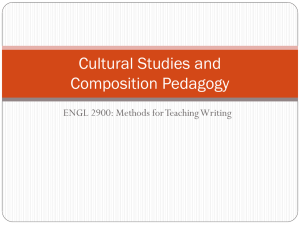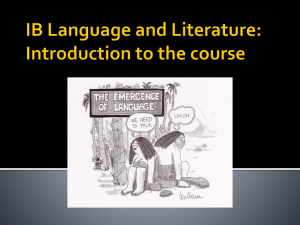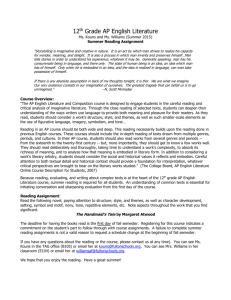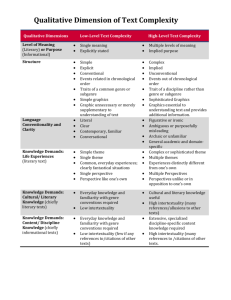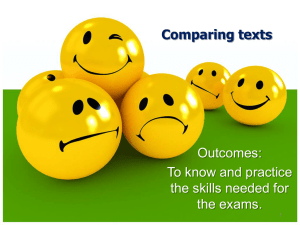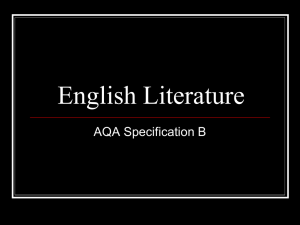How to write a personal response
advertisement
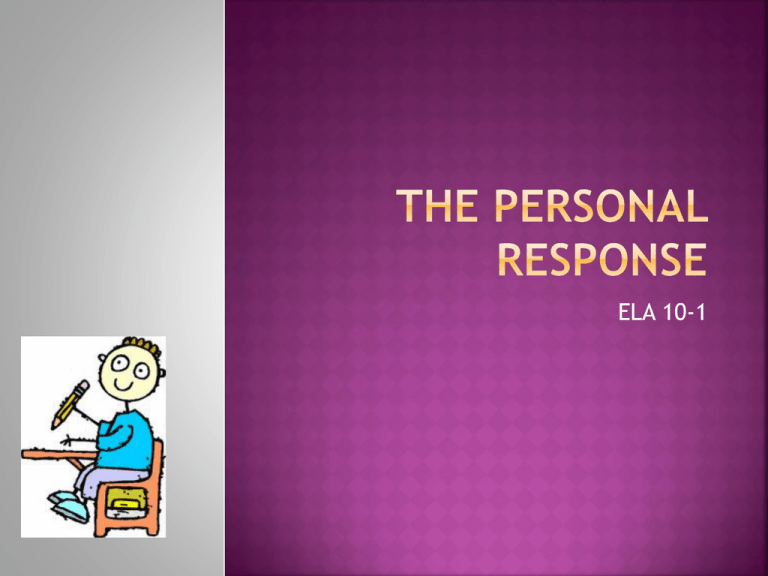
ELA 10-1 State your idea and then defend the ideas with details from the text. Personal responses help you take your own knowledge and experiences and apply them to what you have seen and read. You make connections to what you know of the world with the ideas presented in the texts. The response is PERSONAL so you can take a creative, personal, or critical approach. The only thing not allowed is POETRY. It is designed to be completed in 40 – 60 minutes. At this level we will generally use one full class of time to get you used to the process. A topic is given and you are asked to personally respond to it. This means you may include your point of view, opinion or ideas. What will make your response an excellent response is the quality of you ideas along with how well you are able to express yourself through your ability to: Provide evidence, or support for your interpretation Explain your understanding of that evidence, and your interpretation in detail, then how you unify your idea. Short essay Diary entries Newspaper article Editorial Interior monologue Short story Letter Eulogy Interview Etc. You need to determine 4 things: Theme of the text (idea and impression) Support details from the text Prose form the response will take Perspective the response will take. For the each picture… (write this down) 1. 2. Identify the theme(s) of the text (idea and impression. Identify Support Details from the text (support of the theme) “If ever there is tomorrow when we're not together.. there is something you must always remember. you are braver than you believe, stronger than you seem, and smarter than you think. but the most important thing is, even if we're apart.. I'll always be with you.” -Christopher Robin to Pooh "You can't stay in your corner of the Forest waiting for others to come to you. You have to go to them sometimes." -Pooh 1. 2. Read over the texts – to get a general impression of what they are talking about and to see which ones you identify with. Ensure you understand the topic, focus, and implications of the question. Write the question in your own words or write a quick explanation of the question. 3. Use any clues to the meaning of the texts that are given in the assignment. Be sure to read any captions, footnotes, etc. that would clarify data. 4. Find a focus for your close reading of the texts. Often the text will fall into one of the universal themes: Fear of the unknown The struggle between good and evil The desire for meaningful relationships The desire for understanding, meaning and truth The desire to control our environment The desire to be understood The struggle to meet challenges or overcome adversity 5. Engage in close reading of the texts, recording your thoughts and impressions as you go. This could be jot notes, highlighting, circling terms, paraphrasing, etc. 6. Move from a literary understanding of the text to an exploration of deeper meaning by asking: What is literally happening in the text? What is the speaker’s attitude or feeling? Does this change at any point in the text? Are there choices made? What are the reasons behind these choices? How is the individual or society affected by these choices? Is there any contrasts made within and between the texts in regards to mood, images, word choice, etc. 7. Look at literary devices to help with your interpretations. Symbolism Archetypes Allusions Metaphors Make notes or brainstorm your interpretations of the text(s). 8. 9. Decide on your controlling idea. Just like a critical essay you must develop an controlling idea to keep you on track and focused. 10. Decide on your approach. Are you going to argue a point, persuade an audience, explain something, or reflect… 11. Determine the form of prose you will use. Remember you can take a critical, creative, or personal approach. Insight pertaining to your examination of topic. 1. 2. 3. Evidence of the quality and the kinds of thinking you have used to explore the topic thoroughly. Confidence in your attitude or position about the idea or impression you are putting forth. You must know what you are writing about. You must argue your controlling idea effectively. Evidence of support, and that your choices are purposeful. Reference to the texts in question, reference to your own experience, or using your personal knowledge to investigate the ideas are all valid approaches.





